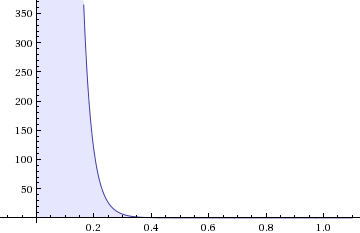Not Reduction Formula
 ∫
0
1
ln
1
0
x
d
x
=
?
∫
0
1
ln
1
0
x
d
x
=
?
Bonus: find the general form of ∫ 0 1 ln n x d x for positive integer n .
This section requires Javascript.
You are seeing this because something didn't load right. We suggest you, (a) try
refreshing the page, (b) enabling javascript if it is disabled on your browser and,
finally, (c)
loading the
non-javascript version of this page
. We're sorry about the hassle.
3 solutions
Another similar approach could be, to consider the following integral -
I ( a ) = ∫ 0 1 x a d x = a + 1 1
Now, on differentiating the above expression with w.r.t to a we get
I ′ ( a ) = ∫ 0 1 x a ln x d x = ( a + 1 ) 2 − 1
Similarly differentiating it again and again, we get
I ( n ) ( a ) = ∫ 0 1 x a ln n x d x = ( a + 1 ) n + 1 ( − 1 ) n n !
Plugging a = 0 gives the result.
Log in to reply
Richard Feynman was seriously a dude!!respect for him! And great work buddy!
did the same...
Here's my solution
We are required to calculate I 1 0 = ∫ 0 1 ln 1 0 x d x
So let us first derive a general formula.
Consider I n = ∫ 0 1 ln n x d x .
Put x = e t and d x = e t d t
Then we have I n = ∫ − ∞ 0 t n e t d t = x → − ∞ lim ∫ x 0 t n e t d t
Take M n = ∫ x 0 t n e t d t
Using integration by parts we obtain
M n = − x n e x − n M n − 1
Taking the limit of both sides as x → − ∞ , we get
I n = 0 − n I n − 1 ⟺ I n − 1 I n = − n
So we also have
I n − 2 I n − 1 = − ( n − 1 )
and so on till
I 0 I 1 = − 1
Multiplying all of these and observing that this is a telescoping product, we have I 0 I n = ( − 1 ) n n !
We have I 0 = ∫ 0 1 1 d x = 1
Therefore I n = ( − 1 ) n n !
Finally I 1 0 = ( − 1 ) 1 0 1 0 ! = 1 0 ! = 3 6 2 8 8 0 0 is the answer
Yup that is the same thing we do for calculating the gamma value of n if n is an integer!good work!:D
This exercise led me to calculate a formula for
∫ ln n ( x ) d x
it is
∫ ln n ( x ) d x = x k = 0 ∑ n ( − 1 ) k ( n − k ) ! n ! ln n − k ( x ) + c
I used integration by parts and induction on n to get it, but to prove it works you can simply derive it.
So
∫ 0 1 ln n ( x ) d x = = k = 0 ∑ n ( − 1 ) k ( n − k ) ! n ! ln n − k ( 1 ) − x ↦ 0 + lim x k = 0 ∑ n ( − 1 ) k ( n − k ) ! n ! ln n − k ( x ) = k = 0 ∑ n − 1 ( − 1 ) k ( n − k ) ! n ! ln n − k ( 1 ) + n ! − k = 0 ∑ n ( − 1 ) k ( n − k ) ! n ! x ↦ 0 + lim x ln n − k ( x ) = = k = 0 ∑ n − 1 ( − 1 ) k ( n − k ) ! n ! ⋅ 0 + n ! − k = 0 ∑ n ( − 1 ) k ( n − k ) ! n ! ⋅ 0 = n ! For n = 1 0 we get our result
∫ 0 1 ln n ( x ) d x = 1 0 ! = 3 6 2 8 8 0 0
@Andrea Palma pretty nice workout indeed sir
Log in to reply
Thanks Mister Gupta! Very nice of you! By the way my solution is just a mere integration by parts :) I greatly admire your sweet solution and Mister Jaiswal's solution!
Edit: and of course Mr Mohammed solution too! (just noticed)
Consider: I = ∫ 0 1 lo g n x d x
Set lo g x = t
So, I = ∫ − ∞ 0 t n e t d t
Also let t = − p So, I = ( − 1 ) n ∫ 0 ∞ p n e − p d p
Or, I = ( − 1 ) n Γ ( n + 1 ) = ( − 1 ) n n !
So, ∫ 0 1 lo g 1 0 x d x = 1 0 ! = 3 6 2 8 8 0 0